
The Beatles, also referred to colloquially as the White Album, is the ninth studio album and only double album by the English rock band the Beatles, released on 22 November 1968. Featuring a plain white sleeve, the cover contains no graphics or text other than the band's name embossed. This was intended as a direct contrast to the vivid cover artwork of the band's previous LP, Sgt. Pepper's Lonely Hearts Club Band (1967). The Beatles is recognised for its fragmentary style and diverse range of genres, including folk, country rock, British blues, ska, music hall, proto-metal and the avant-garde. It has since been viewed by some critics as a postmodern work, as well as one of the greatest albums of all time. The album was the band's first LP release on their then-recently founded Apple Records after previous albums were released on Parlophone in the United Kingdom and Capitol Records in the United States.

Abbey Road is the eleventh studio album by the English rock band the Beatles, released on 26 September 1969, by Apple Records. It is the last album the group recorded, although Let It Be (1970) was the last album completed before the band's break-up in April 1970. It was mostly recorded in April, July, and August 1969, and topped the record charts in both the United States and the United Kingdom. A double A-side single from the album, "Something" / "Come Together", was released in October, which also topped the charts in the US.

"Because" is a song written by John Lennon and recorded by the English rock band the Beatles. It was released on their 1969 album Abbey Road, immediately preceding the extended medley on side two of the record. It features a prominent three-part vocal harmony by Lennon, Paul McCartney and George Harrison, recorded three times to make nine voices in all.
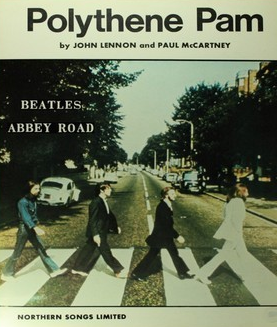
"Polythene Pam" is a song by the English rock band the Beatles from their 1969 album Abbey Road. Written by John Lennon and credited to Lennon–McCartney, it is the fourth song of the album's climactic side-two medley. The Beatles recorded the track in July 1969 as a continuous piece with "She Came In Through the Bathroom Window", which follows it in the medley.

"She Came In Through the Bathroom Window" is a song by the English rock band the Beatles from their 1969 album Abbey Road. Written by Paul McCartney and credited to Lennon–McCartney, it is the fifth song of the album's climactic medley, immediately following "Polythene Pam".
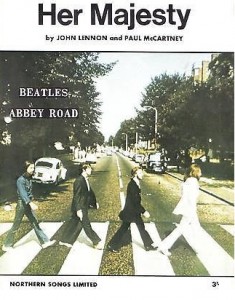
"Her Majesty" is a song by the English rock band the Beatles, from their 1969 album Abbey Road. Written by Paul McCartney and credited to Lennon–McCartney, it is a brief tongue-in-cheek music hall song. McCartney is the only musician to appear on the track. "Her Majesty" is the final cut on the album and appears 14 seconds after the previous song "The End", but was not listed on the original sleeve. Some observers consider it the first example of a hidden track.

"Maxwell's Silver Hammer" is a song by the English rock band the Beatles from their 1969 album Abbey Road. It was written by Paul McCartney and credited to the Lennon–McCartney partnership. The song is about a student named Maxwell Edison who commits murders with a hammer, with the dark lyrics disguised by an upbeat sound. McCartney described the song as symbolic of the downfalls of life, being "my analogy for when something goes wrong out of the blue, as it so often does".

"Yer Blues" is a song by the English rock band the Beatles, from their 1968 double album The Beatles. Though credited to Lennon–McCartney, the song was written and composed by John Lennon during the Beatles' retreat in Rishikesh, India. The song is a parody of blues music, specifically English imitators of blues.
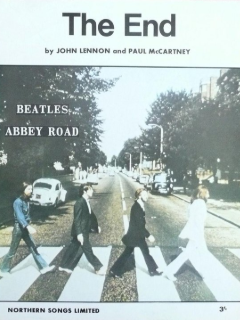
"The End" is a song by the English rock band the Beatles from their 1969 album Abbey Road. It was composed by Paul McCartney and credited to Lennon–McCartney. It was the last song recorded collectively by all four Beatles, and is the final song of the medley that constitutes the majority of side two of the album. The song features the only drum solo recorded by Ringo Starr with the Beatles.

"You Know My Name (Look Up the Number)" is a song by the English rock band the Beatles released initially as the B-side of the single "Let It Be" on 6 March 1970. Although first issued with their final single (and the penultimate single in the United States), the Beatles recorded the song in four separate sessions, beginning with three in May and June 1967, during the sessions for Magical Mystery Tour, with one final recording session conducted in April 1969 during the last sessions for Let It Be and Abbey Road. The song features a saxophone part played by Brian Jones of The Rolling Stones.

"Oh! Darling" is a song by the English rock band the Beatles, appearing as the fourth song on their eleventh studio album Abbey Road (1969). It was written primarily by Paul McCartney and credited to Lennon–McCartney. Its working title was "Oh! Darling ". Although not issued as a single in either the United Kingdom or the United States, a regional subsidiary of Capitol successfully edited it as a single in Central America, having "Maxwell's Silver Hammer" as its B-side. It was also issued as a single in Portugal. Apple Records released "Oh! Darling" in Japan with "Here Comes the Sun" in June 1970.
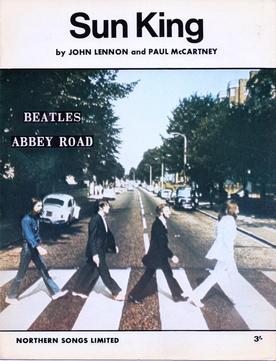
"Sun King" is a song by the English rock band the Beatles from their 1969 album Abbey Road. Written by John Lennon and credited to Lennon–McCartney, it is the second song of the album's climactic medley. Like other tracks on the album the song features lush multi-tracked vocal harmonies, provided by Lennon, Paul McCartney and George Harrison.

"You Never Give Me Your Money" is a song by the English rock band the Beatles. It was written by Paul McCartney, and thematically documents the personal difficulties that were facing the band. The song is the first part of the medley on side two of their 1969 album Abbey Road and was recorded in stages between May and August that year.
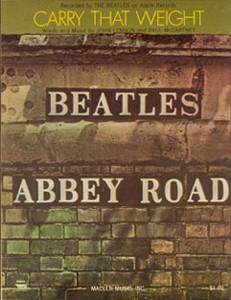
"Carry That Weight" is a song by the English rock band the Beatles from their 1969 album Abbey Road. Written by Paul McCartney and credited to Lennon–McCartney, it is the seventh and penultimate song in the album's climactic side-two medley. It features unison vocals in the chorus from all four Beatles, a rarity in their songs. It is preceded by "Golden Slumbers" and segues into "The End".

"Sgt. Pepper's Lonely Hearts Club Band" is a song by the English rock band the Beatles, written by Paul McCartney, credited to Lennon–McCartney, and released in 1967 on the album of the same name. The song appears twice on the album: as the opening track, and as "Sgt. Pepper's Lonely Hearts Club Band (Reprise)", the penultimate track. As the title song, the lyrics introduce the fictional band that performs on the album.
"Mr. Moonlight" is a song written by Roy Lee Johnson and recorded by Dr. Feelgood and the Interns in 1962. The song was covered by the Beatles on their 1964 albums Beatles for Sale and Beatles '65.
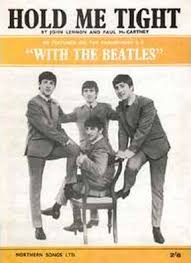
"Hold Me Tight" is a song by the English rock band the Beatles from their 1963 album With the Beatles. It was first recorded during the Please Please Me album session, but not selected for inclusion and re-recorded for their second album.

"I'll Get You" is a song by the English rock band the Beatles, written by John Lennon and Paul McCartney, and released by the Beatles as the B-side of their 1963 single "She Loves You". The song was initially titled "Get You in the End".

"Golden Slumbers" is a song by the English rock band the Beatles from their 1969 album Abbey Road. Written by Paul McCartney and credited to Lennon–McCartney, it is the sixth song of the album's climactic B-side medley. The song is followed by "Carry That Weight" and begins the progression that leads to the end of the album. The two songs were recorded together as a single piece, and both contain strings and brass arranged and scored by producer George Martin.
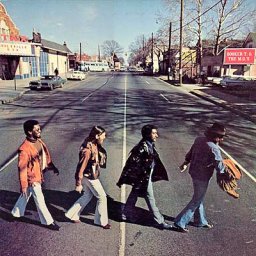
McLemore Avenue is a 1970 album by Booker T. & the M.G.s, consisting entirely of mostly instrumental covers of songs from the Beatles' album Abbey Road. The title and cover are an homage to the Beatles album, 926 East McLemore Avenue being the address of the Stax Studios in Memphis, as Abbey Road was for London’s EMI Studios, which were soon renamed Abbey Road Studios. As a nod to Abbey Road's medley, most of the M.G.s' selections are arranged into their own medleys..















